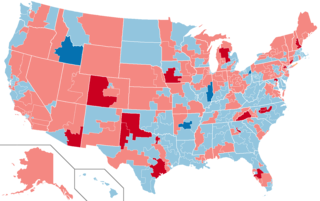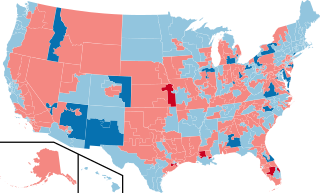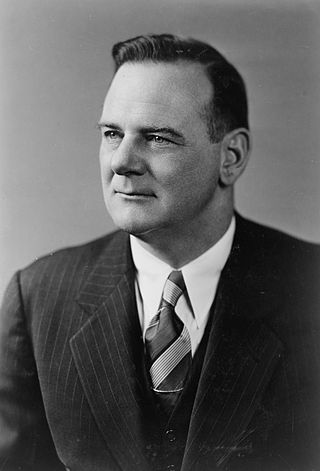
Sander Martin Levin is an American politician who served in the United States House of Representatives from 1983 to 2019, representing Michigan's 9th congressional district. Levin, a member of the Democratic Party from Michigan, is a former ranking member on the House Ways and Means Committee; he was Chairman of the Ways and Means Committee from 2010 to 2011. He is the older brother of former U.S. Senator Carl Levin, and the father of former Congressman Andy Levin, his successor.

The 1970 United States Senate elections was an election for the United States Senate. It took place on November 3, with the 33 seats of Class 1 contested in regular elections. Special elections were also held to fill vacancies. These races occurred in the middle of Richard Nixon's first term as president. The Democrats lost a net of three seats, while the Republicans and the Conservative Party of New York picked up one net seat each, and former Democrat Harry F. Byrd Jr. was re-elected as an independent.

The 1964 United States Senate elections were held on November 3. The 33 seats of Class 1 were contested in regular elections. Special elections were also held to fill vacancies. They coincided with the election of President Lyndon B. Johnson by an overwhelming majority, to a full term. His Democratic Party picked up a net two seats from the Republicans. As of 2022, this was the last time either party has had a two-thirds majority in the Senate, which would have hypothetically allowed the Senate Democrats to override a veto, propose constitutional amendments, or convict and expel certain officials without any votes from Senate Republicans. In practice, however, internal divisions effectively prevented the Democrats from doing so. The Senate election coincided with Democratic gains in the House in the same year.

The 1984 United States House of Representatives elections was an election for the United States House of Representatives on November 6, 1984, to elect members to serve in the 99th United States Congress. They coincided with the re-election of President Ronald Reagan in a landslide. This victory also yielded gains for Reagan's Republican Party in the House, where they picked up a net of sixteen seats from the Democratic Party. Despite Reagan's extremely large electoral victory, the Democrats nonetheless retained a commanding majority in the House and actually gained seats in the Senate. These elections were the last until 2020 when a member of a political party other than the Democrats, Republicans, or an independent had one or more seats in the chamber.

The 1964 United States House of Representatives elections was an election for the United States House of Representatives on November 3, 1964, to elect members to serve in the 89th United States Congress. They coincided with the election to a full term of President Lyndon B. Johnson. Johnson's landslide victory over Barry Goldwater allowed his Democratic Party to gain a net of 36 seats from the Republican Party, giving them a two-thirds majority in the House. The election also marked the first time since Reconstruction that Republicans made inroads in the Deep South, with Republicans winning seats in Georgia for the first time since 1874, and Alabama and Mississippi since 1876.

The Michigan Republican Party is the state affiliate of the national Republican Party in Michigan, sometimes referred to as MIGOP. Ronald Weiser was elected chairman in 2021.

The 2008 United States House of Representatives elections were held on November 4, 2008, to elect members to the United States House of Representatives to serve in the 111th United States Congress from January 3, 2009, until January 3, 2011. It coincided with the election of Barack Obama as President. All 435 voting seats, as well as all 6 non-voting seats, were up for election. The Democratic Party, which won a majority of seats in the 2006 election, expanded its control in 2008.

Richard Franklin Vander Veen was a politician from the U.S. state of Michigan.

George Meader, was a Republican politician from the US state of Michigan.

The 1994 United States Senate election in Michigan was held November 8, 1994. Incumbent Democratic U.S. Senator Don Riegle decided to retire and not run for re-election. Republican Spencer Abraham won the open seat, becoming the first Republican to win a U.S. Senate race in Michigan since Robert P. Griffin in 1972 and the first to win the state's Class I seat since Charles E. Potter in 1952. As of 2023, this was the last time the Republicans won a U.S. Senate election in Michigan.

The 2014 Michigan gubernatorial election took place on November 4, 2014, to elect the Governor of Michigan, concurrently with the election of Michigan's Class II U.S. Senate seat, as well as other elections to the United States Senate in other states and elections to the United States House of Representatives and various state and local elections.

The 2014 United States Senate election in Michigan was held on November 4, 2014, to elect a member of the United States Senate to represent the State of Michigan, concurrently with the election of the governor of Michigan, as well as other elections to the United States Senate in other states and elections to the United States House of Representatives and various state and local elections.

The 1964 United States Senate election in Arizona took place on November 3, 1964. Incumbent Republican U.S. Senator Barry Goldwater decided not to run for reelection to a third term, instead running for President of the United States as the Republican Party nominee against Lyndon B. Johnson. Governor of Arizona Paul Fannin ran unopposed in the Republican primary, and defeated Democratic nominee Roy Elson, who was a staff member for U.S. Senator Carl Hayden until Hayden's retirement in 1969.

The 2018 Michigan gubernatorial election took place on November 6, 2018, to elect the next governor of Michigan, concurrently with the election of Michigan's Class I U.S. Senate seat, as well as other elections to the United States Senate in other states, elections to the United States House of Representatives, and various state and local elections.

The 1964 United States Senate election in Maine was held on November 3, 1964. Incumbent Democrat Edmund Muskie was re-elected to a second term in office over Republican U.S. Representative Clifford McIntire. This was the first senate race for this particular seat in which the election was held in November and not September.

The 2018 United States Senate election in Michigan took place on November 6, 2018, in order to elect the Class 1 U.S. Senator from the State of Michigan, concurrently with a gubernatorial election, as well as other elections to the U.S. House of Representatives.

The 2020 United States Senate election in Michigan was held on November 3, 2020, to elect a member of the United States Senate to represent Michigan. It was held concurrently with the 2020 U.S. presidential election, as well as other elections to the United States Senate, elections to the United States House of Representatives and various state and local elections.

The 1936 United States Senate election in Michigan was held on November 3, 1936. Incumbent Republican U.S. Senator James J. Couzens ran for re-election to a third term in office, but was defeated in the Republican primary by Governor Wilber Brucker. Brucker was defeated in the general election by Democratic U.S. Representative Prentiss M. Brown, becoming the first Democrat to win this seat since 1853.

The 2024 United States Senate election in Michigan will be held on November 5, 2024, to elect a Class I member of the United States Senate to represent the state of Michigan. It will be held concurrently with the 2024 United States presidential election, other elections to the United States Senate, other elections to the United States House of Representatives, and various state and local elections. Primary elections will take place on August 6, 2024.

Two special elections for the Michigan Senate were held in the U.S. state of Michigan on November 2, 2021, in addition to various other local elections and ballot measures.





















